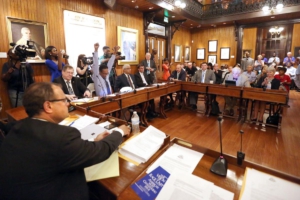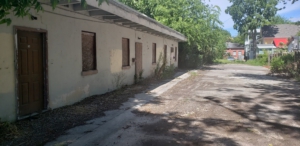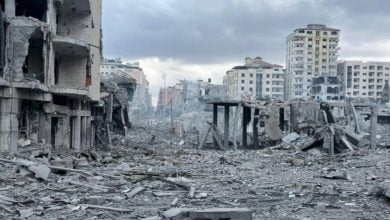 On June 19, the Charleston, South Carolina City Council voted 7-5 to apologize for its role in the slave trade. About 40 percent of enslaved African people who came to what became the U.S. passed through the port at Charleston. The marketplace where the kidnapped Africans were sold still stands in the city but is now filled with other commodities. The bodies of women, men and children who didn’t make it to the market were thrown into the Charleston harbor.
On June 19, the Charleston, South Carolina City Council voted 7-5 to apologize for its role in the slave trade. About 40 percent of enslaved African people who came to what became the U.S. passed through the port at Charleston. The marketplace where the kidnapped Africans were sold still stands in the city but is now filled with other commodities. The bodies of women, men and children who didn’t make it to the market were thrown into the Charleston harbor.
Charleston truly came into being “dripping from head to foot, from every pore, with blood and dirt.”
It’s obvious to all honest people that the city has a very ugly history, and it’s fitting that the city formally apologized for this. However many are saying the apology is not enough—too little and too late—and that what’s really needed are reparations to begin to right the wrongs of Charleston.
This was even expressed at the City Council in the debate before the vote. For example, Perry K. Waring, a Black council member, criticized the apology and voted against it because it did not include specific economic measures to uplift the Black community which had been held down for centuries. He brought up the need for affordable housing for Black residents and extending zoning permits for Black owned businesses—both measures well within the power of the City Council.
 Due to historical enslavement, Jim Crow apartheid, and other vestiges of racism, there is a large gap in the conditions for Black and white residents. The State of Racial Disparities Report shows that the gap has not improved in 50 years. The median income for Black families in Charleston and North Charleston was $29,799, less than half the median income white families earned: $64,553. The report shows how this gap exists in other areas of life including education and jobs.
Due to historical enslavement, Jim Crow apartheid, and other vestiges of racism, there is a large gap in the conditions for Black and white residents. The State of Racial Disparities Report shows that the gap has not improved in 50 years. The median income for Black families in Charleston and North Charleston was $29,799, less than half the median income white families earned: $64,553. The report shows how this gap exists in other areas of life including education and jobs.
Members of the Party for Socialism and Liberation went to the Westside neighborhood in Charleston, where a historically Black community is being pushed out by gentrification, to speak with residents about their thoughts regarding the apology.
Marcus Williams moved to Charleston in 1963 and described the gentrification in this neighborhood. He walks around his community regularly to see what the people want and to get them involved in the neighborhood association. In response to the Charleston City Council apologizing for slavery Mr. Williams told Liberation: “An apology won’t do anything good without action. The apology is overdue and and the government has been avoiding the issue for 200 years. … How are we the home of the free and brave, when we are not free? We aren’t free for one minute, because we have to fight every minute. … I can’t help what happened 200 years ago, what will [the City Council] do for my children and my children’s children?”
Anther resident, Dolores, from the New Holmes Street Baptist Church said about the apology to Liberation: “Things have not changed. Apology should have been done so many moons ago and not just so they can get re-elected”.
Brother David Jackson, also from the New Holmes Street Baptist Church, told Liberation: “Still too much trafficking of people and we still don’t have access to resources. [We need to] abolish [racism] altogether, wipe it out. Lincoln abolished [slavery], but here we are today, 1865-2018, all together and taken out.”





